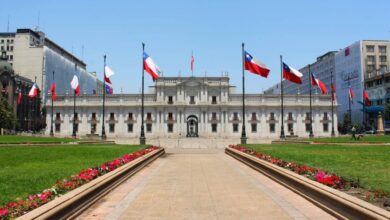With the results of the historic Chilean vote in which the 'Rejection' option obtained the majority on September 4, the Executive calls for a new assembly to remedy the errors that led to the refusal to change the Magna Carta established by Pinochet 40 years ago.

Photo: Pixabay
LatinAmerican Post | David García Pedraza
Listen to this article
Leer en español: Chile: La difícil tarea de crear una constitución en la que todos se sientan representados
September 4 marked a before and after in the democratic history of Chile, after more than a year in which men and women, alike, drafted what would be the new Political Constitution of Chile. This was rejected by more than 60% of the population at the polls. With more than 99% of the tables counted, only 38% approved the new Magna Carta, which meant a direct defeat for Chilean President Gabriel Boric. The president had promised in the campaign to carry out the proposal for the new Constitution in the first attempt, despite the fact that in Congress (both in the upper and lower houses), the opposition to his government had parliamentary majorities.
Read also: Petro and Boric: a Latin American Left Different from the Socialism of the 21st Century
Boric, who has been in office for almost six months, has had to face the mass hysteria of the center and right-wing parties, in addition to the subtle but challenging economic situation in the South American country. According to the Central Bank, despite the fact that the financial situation expanded by 5.4% from April to June, poverty continues to rise, and now the rejection of what would have been its greatest political aspiration, the expiration of the Constitution left by Pinochet.
Chile wants a new Constitution, but not like this
Due to the civil unrest that occurred in 2019 in Chile, especially in the capital, Santiago, the idea of completely reforming the country's Constitution, which has been desired since 1989, began to gain strength among the protesters who asked for solutions to the government due to budget cuts in public policies and the handling of the nation's heritage. Despite the fact that at the time the president at that time, Sebastián Piñera, gave a resounding no to the idea of a constituent assembly, he finally gave in and during the last year of his mandate he made available the resources for the execution of this plan.
After more than 78% of the population said Yes to the change of the Magna Carta in October 2020, the Chilean community was hopeful, since, in the midst of the Covid-19 pandemic, the idea that a constitution created under the Pinochet dictatorship would soon come to an end was an achievement requested by the general public. However, Chile said no to the proposal, to a certain extent due to factors such as false news and the weight of leftist ideas in a Charter that is for the entire population.
The victory of 'Rejection' is an example of a paradox
One of the figures who promoted the rejection of the already dismissed new constitution was former deputy and presidential candidate José Antonio Kast, a subtle admirer of Augusto Pinochet. Kast expressed that the drafting of the new Magna Carta harmed the individual freedoms of Chileans, in addition to giving supremacy to indigenous peoples, whose privileges would lead Chile to greater economic destabilization. Kast, who was Boric's opponent in the last elections, has strong positions against abortion and left-leaning laws, for this reason, he was considered the head of the 'Rejection' vote that Chileans chose at the polls as the winner.
Another aspect of the rejection of being victorious in the contest was the lack of a concise speech, where the articles demanded by the new constitution were understood in simple words. Several supporters of the 'I approve' option did not know how to express their ideas in a correct way, which is why the voters were hesitant to support the initiative. Adding the factor of disinformation through social networks and WhatsApp channels, a well-known strategy to confuse the population, the supporters of 'I Approve' conceded defeat to false communications and interpretations.
Finally, the economic uncertainty, regardless of the outcome, was a key argument for the rejection of this constitution. For his part, President Gabriel Boric has called a meeting of Ministers so that, during the week following the vote, assertive actions are taken to achieve a new consensus. Boric is determined to overthrow the current Constitution no matter what. On the other hand, the Chilean right has said that they will continue to be part of the conversation, but they have not said how, despite the clashes in the streets that have already taken over Santiago, as a way of putting pressure on both sides of the issue.
Chileans want an equal change
The legalization of abortion, stricter environmental laws, support for social projects, and the political and special situation of indigenous people are very specific issues where the wording of the new Constitution must be very balanced in order to achieve a national agreement, and therefore civil approval. This was an aspect where this attempt failed, since, according to several academics, despite the fact that the ideas are very well exposed, they are not approved by a certain percentage of the population.
The Chileans, the Congress, and the desire for dialogue between the two sides are the three necessary pillars for the nation to emerge favored in a new attempt to leave the controversial but functional Constitution of Augusto Pinochet in history.





